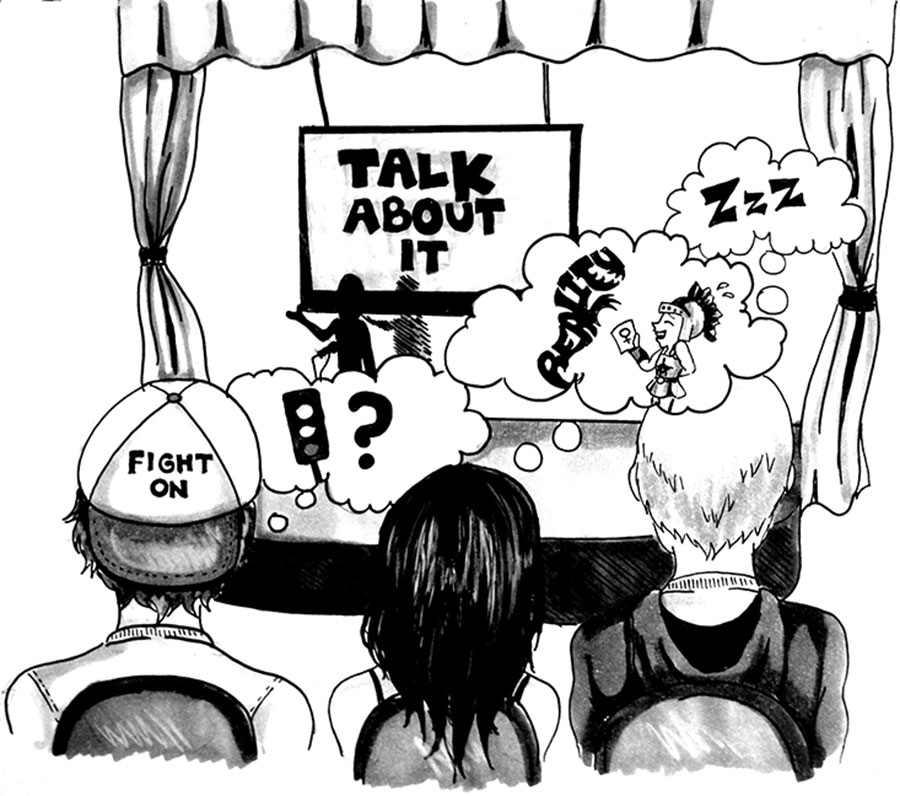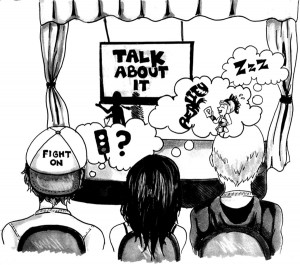New initiatives on sexual misconduct fall short
Early this semester, USC students received an email from Provost and Senior Vice President for Academic Affairs Elizabeth Garrett entitled “New Initiatives Against Sexual Misconduct for Fall 2014.” The memo was short and to the point, reassuring students that USC does “not tolerate sexual misconduct in any form” and listing new steps Student Affairs would be taking to address the issue.
What many students might not know is that incoming students received a second email from Provost Garrett, this one regarding a mandatory online training to follow up the also mandatory “Talk About It” session during Welcome Week. Both “Talk About It” and the online training, “Think About It,” were introduced by the university this year to combat previous violations of Title IX.
“Talk About It,” a 45-minute presentation, focused on informed consent, bystander responsibilities and campus resources for victims of sexual assault. The more comprehensive online training, which took about two hours to complete, included information on partying, sexual assault and healthy relationships.
Despite the comprehensiveness of the trainings, these initiatives still fall short of the necessary steps that must be taken to combat sexual assault on USC’s campus.
Daniel Yang, a freshman majoring in health promotion and disease prevention studies, attended the “Talk About It” session during Welcome Week.
“The way that they presented their information wasn’t precise, and it was hard to pay attention. But at the same time, when we did tune in, it felt like they weren’t taking it as seriously as they should have,” Yang said. “A lot of information that comes to us as common sense, especially with the way it was taught in high school and even middle school. They didn’t really teach us anything new.”
“Talk About It” defined consent as being “conscious, affirmative, informed and unambiguous,” and also referred to a “stoplight system” for the levels of consent. This system, though, is not realistic to students in the situations proposed in the training.
“If you were in a situation like that, you wouldn’t say, ‘Oh, it’s a red light,’ or something like that,” said Peter Bergmann, a freshman majoring in economics and math.
That touches upon the most conspicuous shortcoming of “Talk About It.” Though the message itself was beneficial, the situations proposed were unrealistic to students. In fact, the phrases “red light,” “yellow light,” “green light” and “healthy threesome” have turned into jokes among freshmen students.
Some students are doubtful of the intent behind the programs. Yushi Wang, a freshman majoring in anthropology, worries that the administration is trying to mask the Title IX issue through these programs.
“It’s not really addressing the issues,” Wang said. “Programs like this, in general, address how we should handle being targeted as victims instead of addressing the people that are actually attacking or sexually abusing other people.”
USC’s attempt to address the issue is admirable, but there are certain flaws within the programs that need to be addressed in order for the efforts to be successful. Freshmen Madi Combs, a biomedical engineering student, proposed a change that could immediately affect the success of “Talk About It.”
“I definitely think it’d be better coming from other students, rather than the faculty and staff that were giving the presentations,” Combs said. “It makes it more personal, more relatable and I think people would pay more attention to it if it came from their level.”
Overall, the online training was more informational and more relatable to college students than the in-person presentation. “Think About It” is different from AlcoholEdu, the mandatory online training regarding drug and alcohol use in college, in that each page is monitored more closely to try to ensure that students are paying better attention.
As Bergmann points out, however, “It just depends on the mindset of the student going into it. If people aren’t willing to actually be open to it at all, it’s not going to be beneficial to them.”
One of the most serious issues with the new initiatives is that neither program addresses the problem that was brought to the nation’s attention in May: improper treatment of sexual assault accusations by the USC administration. Though both the in-person and online sessions mentioned resources for victims of sexual assault, and the online training does provide a copy of the university’s 2014-2015 policy on sexual misconduct, it will be up to the university to ensure that these new policies are actually implemented.
Students at USC deserve to have an enjoyable, safe and educational experience during their time here. Ultimately, it is the responsibility of the administration — not the students — to ensure that USC upholds its promise of ensuring an emotionally and physically safe environment for all.


